Attached files
| file | filename |
|---|---|
| 8-K - FORM 8-K - GULFMARK OFFSHORE INC | d508082d8k.htm |
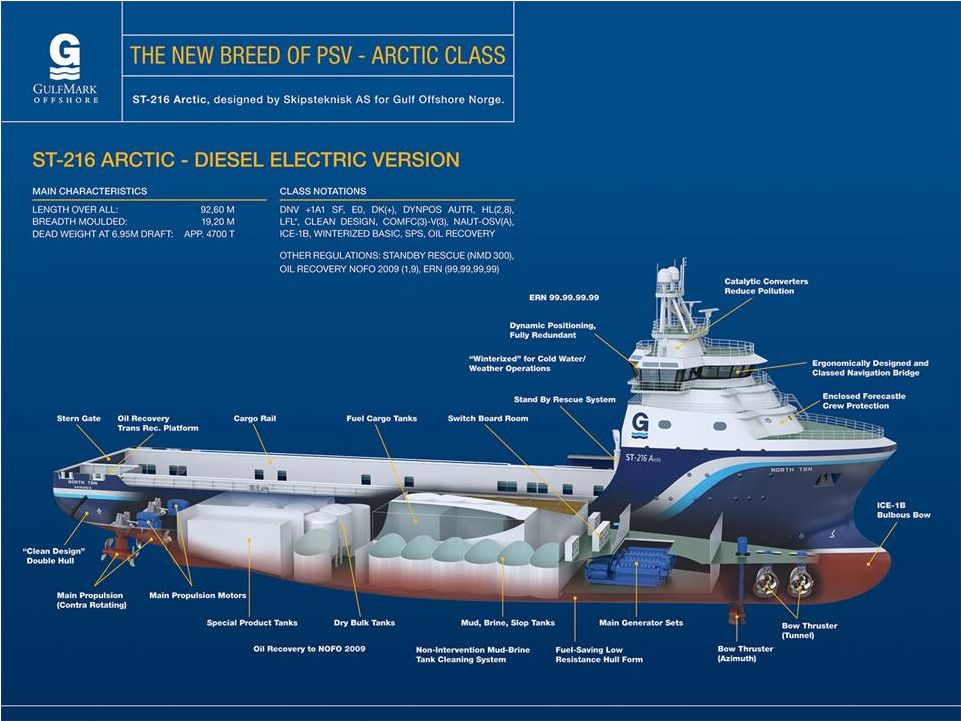 GulfMark Offshore, Inc
Q1 2013 Investor Relations Update |
 Forward
Looking Statements 2
Cautionary Statement Regarding Forward-Looking Statements
NYSE:
GLF
www.GulfMark.com Certain
statements and information in this presentation may constitute “forward-looking statements” within the meaning of
the Private Securities Litigation Reform Act of 1995. The words “believe,”
“expect,” “anticipate,” “plan,” “intend,” “foresee,” “should,”
“would,” “could” or other similar expressions are intended to identify
forward-looking statements, which are generally not historical in nature. These
forward-looking statements are based on our current expectations and beliefs concerning future developments and
their potential effect on us. While management believes that these forward-looking statements are
reasonable as and when made, there can be no assurance that future developments affecting us
will be those that we anticipate. All comments concerning our expectations for future revenues
are based on our forecasts for our existing operations. Our forward-looking statements involve
significant risks and uncertainties (some of which are beyond our control) and assumptions that could
cause actual results to differ materially from our historical experience and our present
expectations or projections. Among the important factors that could cause actual results to
differ materially from those in the forward-looking statements include, but are not limited to: the price of oil and gas
and its effect on offshore drilling, vessel utilization and day rates; industry volatility;
fluctuations in the size of the offshore marine vessel fleet in areas where the Company
operates; changes in competitive factors; delays or cost overruns on construction projects, and
other material factors that are described from time to time in the Company’s filings with the SEC, including the registration
statement and the Company’s Annual Report on Form 10-K for the year ended December 31, 2012,
Quarterly Reports on Form 10-Q and Current Reports on Form 8-K. Consequently, the
forward-looking statements contained herein should not be regarded as representations that
the projected outcomes can or will be achieved. These forward-looking statements speak only as of the date
hereof. We undertake no obligation to publicly update or revise any forward-looking statements
after the date they are made, whether as a result of new information, future events or
otherwise. |
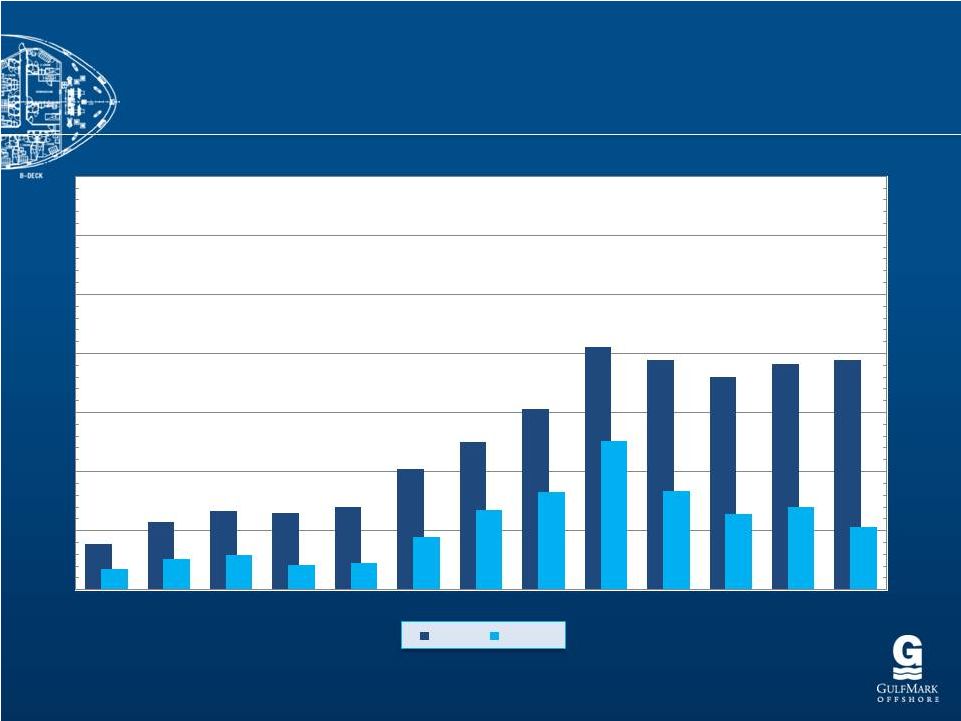 Long Term Revenue & EBITDA
(in millions of dollars)
3
* Note: Adjusted for Special Items, See Supporting Information at the end of this
Presentation $600
$700
$500
$400
$300
$200
$100
$0
$600
$700
$500
$400
$300
$200
$100
$0
2000
2001
2002
2003
2004
2006
2005
2007
2008
2009
2010
2011
2012
Revenue
EBITDA* |
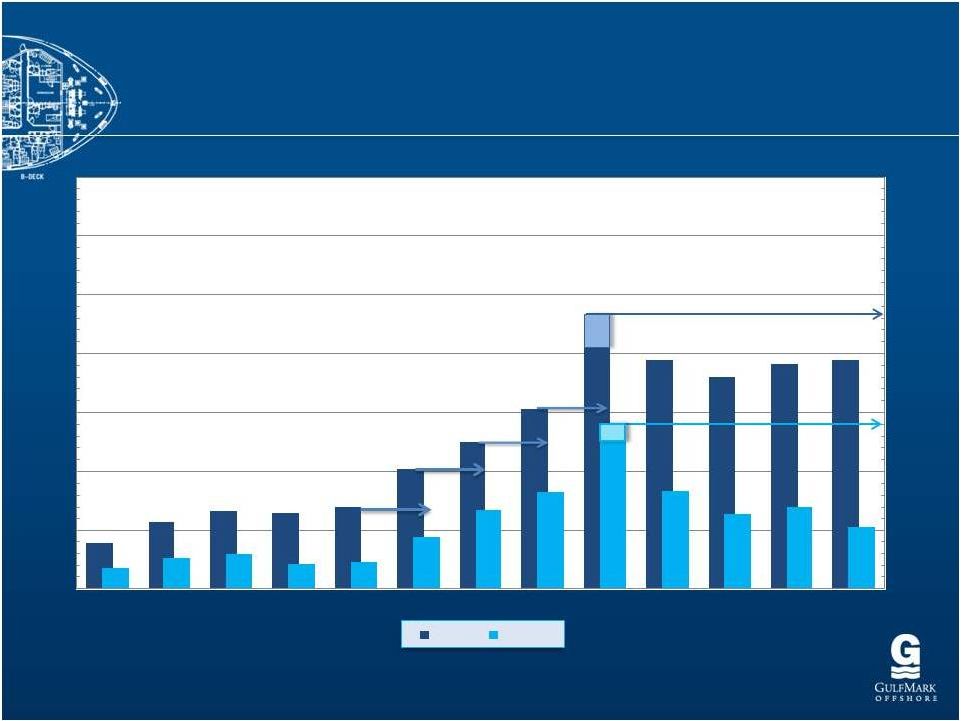 4
* Note: Adjusted for Special Items, See Supporting Information at the end of this
Presentation •
Pro Forma for July 1, 2008 Acquisition
•
Prior Up-Cycle Incremental EBITDA Margins Average 72%
•
Substantial Fleet Upgrades Since 2008
•
11 New Vessels Beginning in 2013
68%
100%
71%
53%
Long Term Revenue & EBITDA
(in millions of dollars)
$600
$700
$500
$400
$300
$200
$100
$0
2000
2001
2002
2003
2004
2005
2006
2007
2008
2009
2010
2011
2012
$600
$700
$500
$400
$300
$200
$100
$0
Revenue
EBITDA* |
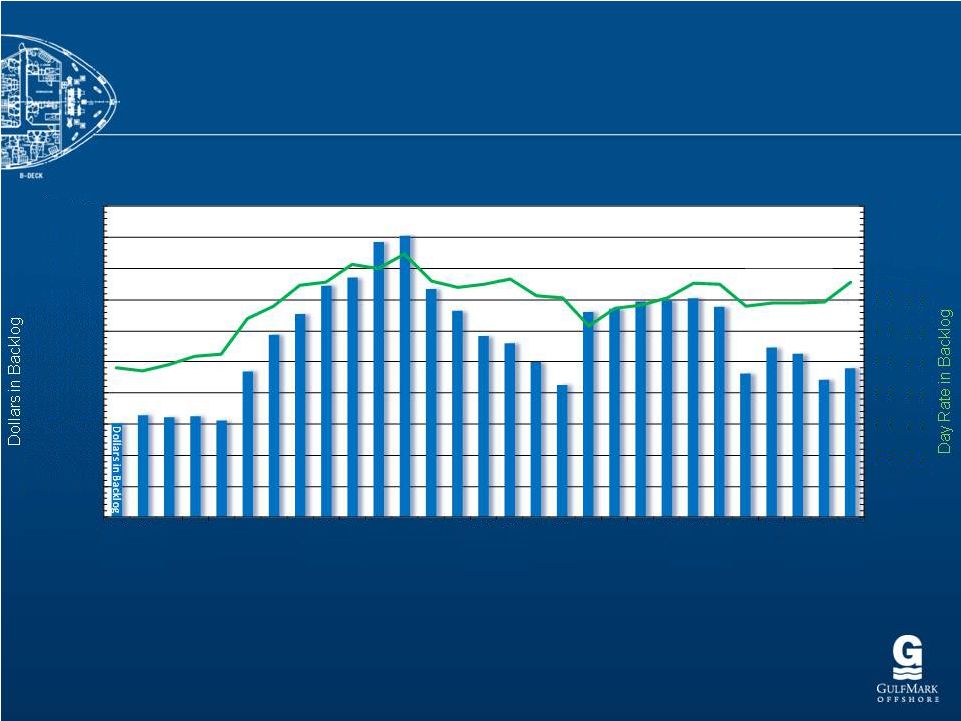 5
Total Revenue in Backlog
(in thousands of dollars)
$0
$2,500
$5,000
$7,500
$10,000
$12,500
$15,000
$17,500
$20,000
$22,500
$25,000
$0
$100,000
$200,000
$300,000
$400,000
$500,000
$600,000
$700,000
$800,000
$900,000
$1,000,000
Q4
2005
Q1
2006
Q2
2006
Q3
2006
Q4
2006
Q1
2007
Q2
2007
Q3
2007
Q4
2007
Q1
2008
Q2
2008
Q3
2008
Q4
2008
Q1
2009
Q2
2009
Q3
2009
Q4
2009
Q1
2010
Q2
2010
Q3
2010
Q4
2010
Q1
2011
Q2
2011
Q3
2011
Q4
2011
Q1
2012
Q2
2012
Q3
2012
Q4
2012
Day Rate in
Backlog |
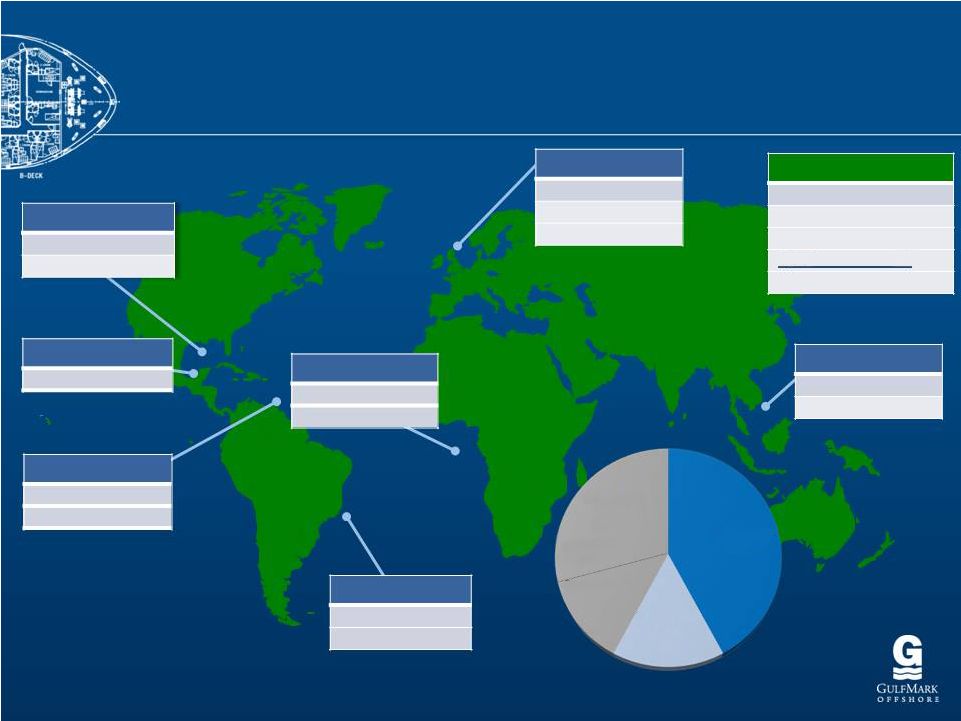 Brazil
PSV
SpV
1 US Gulf
PSV
15
FSV
2 6
Global Vessel Diversification
West
Africa
AHTS 2
PSV
1 Mexico
AHTS
2 Trinidad
PSV
2
FSV
1 North Sea
PSV
20
AHTS
SpV
1
Worldwide
PSV
48
AHTS
17
FSV
3
SpV
2
Total
70
SE Asia
PSV
4
AHTS 12
Revenue Breakout by Region –
Year Ended December 31,
2012
North Sea
42%
Southeast
Asia
16%
13%
29%
Gulf of Mexico
Gulf of Mexico
Gulf of Mexico
Rest of Americas
Americas
42%
6
1 |
 The GulfMark Fleet
7 |
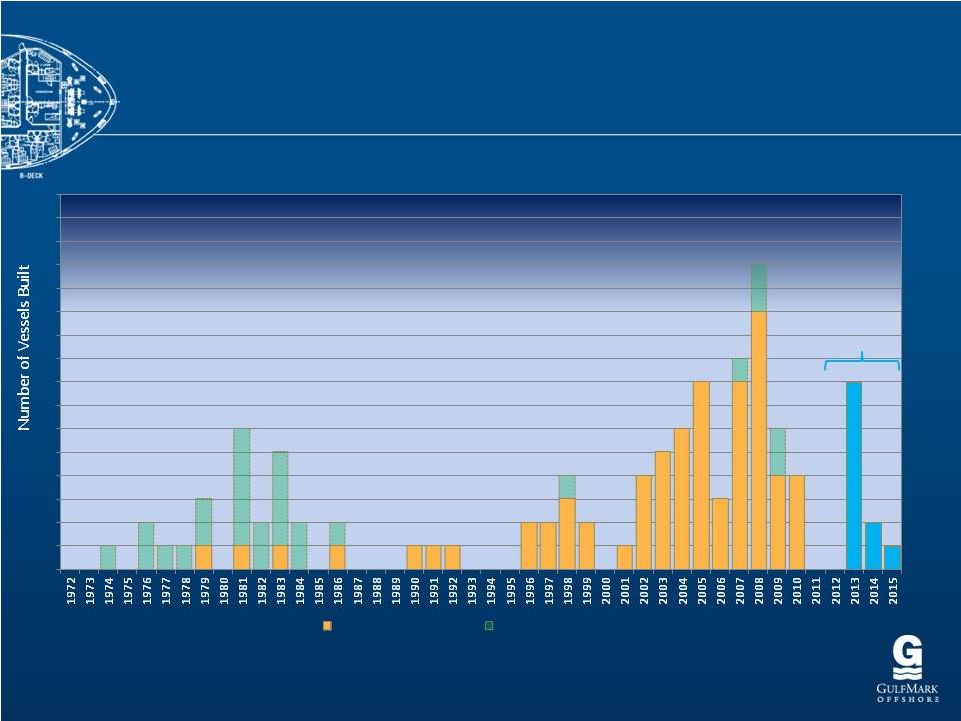 Young & Versatile Fleet
8
Number of Vessels GulfMark Built Per Year
New Build
Deliveries
16
15
14
13
12
11
10
9
8
7
6
5
4
3
2
1
0
16
15
14
13
12
11
10
9
8
7
6
5
4
3
2
1
0
Vessels in Current Fleet
Vessels not in Current Fleet |
 Building For
Our Future 9
Significant number of new generation rigs on order
Increasing Activity both in the North Sea and New Frontiers
Industry call for higher specification vessels to meet increasing regulatory
demands:
•
Deeper Waters and Harsher Environments
•
Increased cargo carrying capacity and flexibility
•
Enhanced Green
Footprint and offering greater safety support |
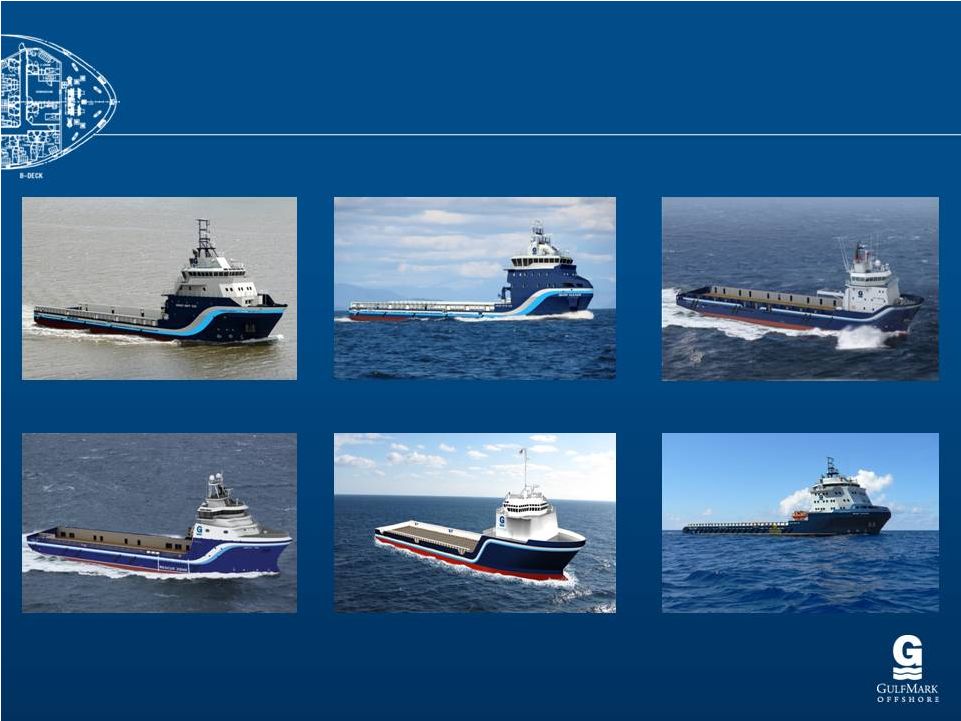 10
New Build Program Overview
Two MMC 887 300 Class DP 2 (Europe)
One MMC 879 280 Class DP2 (Europe)
Two UT 755 XL 250 Class DP2 (Europe)
Two ST-216 300 Class Arctic DP2
(Europe) Two 280 Class PSV DP2 (US)
Two 300 Class PSV DP2 (US) |
 New Build and Vessel Enhancement
Program Summary
11
•
North Sea
•
7 Newbuild Vessels
•
North Sea vessels hedged in EUR
•
DP2 Green PSVs (300 Class (2), 300 Class Arctic (2), 280 Class (1), 250 Class
(2)) •
Staggered delivery of Newbuilds-
2Q 2013 through 1Q 2014
•
U.S. GOM
•
4 Newbuild US Flagged Vessels for Approximately $170 million
•
DP2 Green PSVs (280 Class(2), 300 Class (2))
•
Staggered delivery -
3Q 2013 through 1Q 2015 |
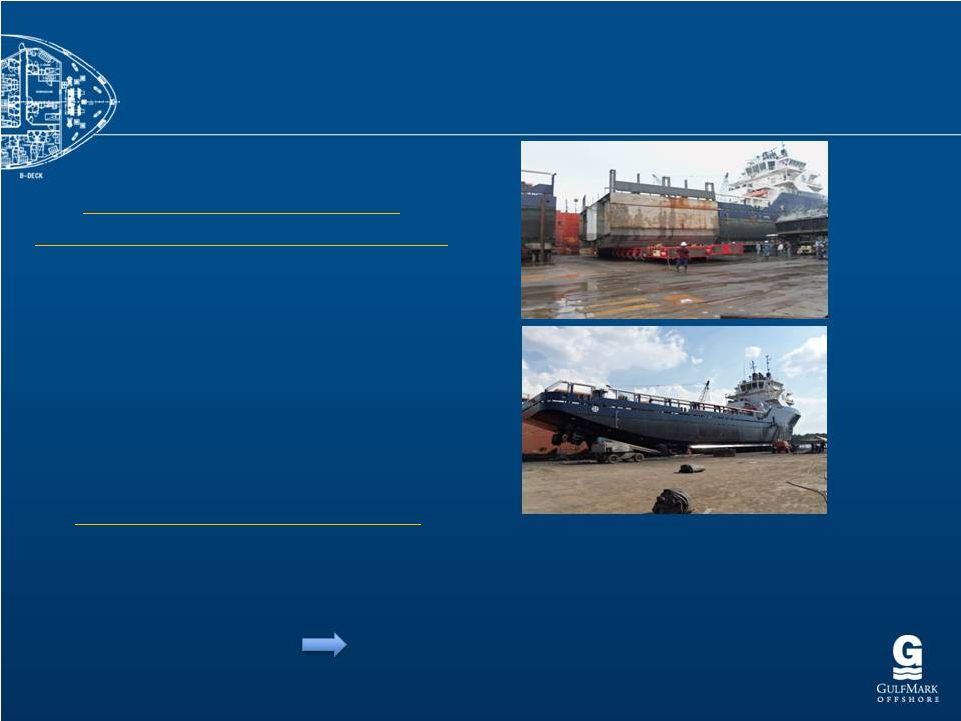 12
2012
Phase
1:
190’
to
230’
Three
Vessels
Completed
2011-12
Avg. Cost Per Vessel
$2.2 million
Avg. Incremental Days Out of Service
77
Avg. Day Rate % Increase
+40%
Avg. Utilization Percentage Increase
18%
Estimated Payback Period (Including
Opportunity Cost)
10.5 months
Return on Net Capital Employed
117%
U.S.
GOM
–
Stretch
Program
•
Completed Three 190’
Vessels in 2011-2012
•
Two Complete During Q1 2013, One Currently in Process
•
Four Additional 190’
Vessels Will Become Stretch Program Candidates During 2015
•
Next Steps –
210 Class 260 Class
•
10 Vessel Candidates, First Vessel to Enter Shipyard in Q2 2013
New Build and Vessel Enhancement
Program Summary, Cont’d |
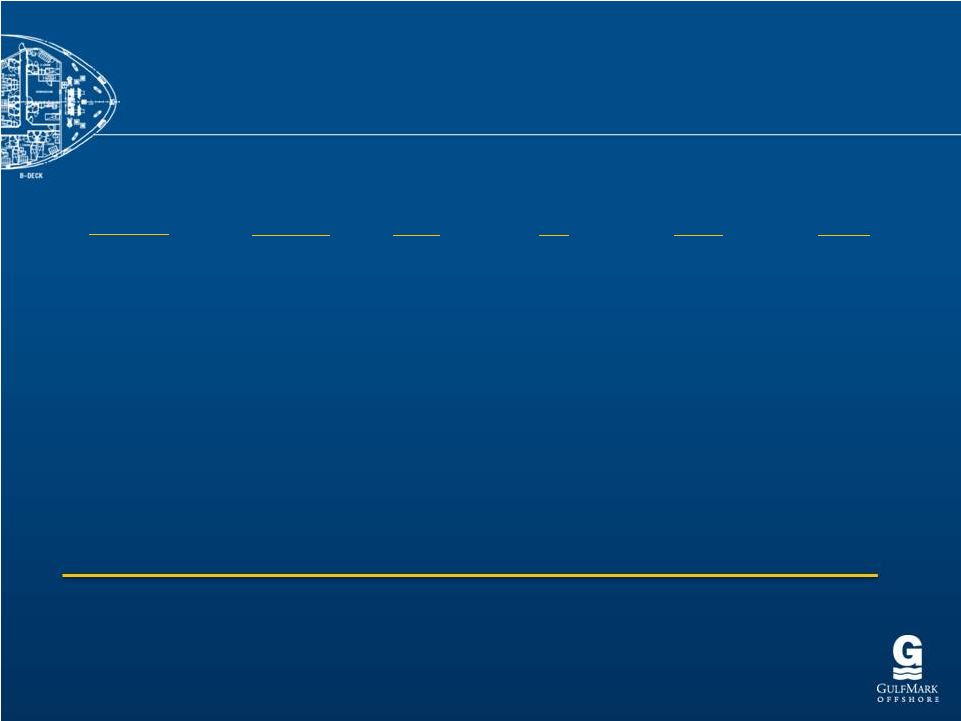 Building For Our Future: 2013 & Beyond
(U.S. dollars, in millions)
13
Vessels Under
Construction
Vessel Type
Initial
Operating
Region
Estimated
Construction
Cost
Estimated
Average Annual
EBITDA
Implied EBITDA
Multiple
300 Class
PSV
North Sea
$37.0
$8.2
4.5x
300 Class
PSV
North Sea
$37.0
$8.2
4.5x
280 Class
PSV
North Sea
$34.0
$7.7
4.4x
300 Class Arctic
PSV
North Sea
$58.0
$10.8
5.4x
300 Class Arctic
PSV
North Sea
$60.0
$10.8
5.6x
250 Class
PSV
North Sea
$31.0
$7.4
4.2x
250 Class
PSV
North Sea
$31.0
$7.4
4.2x
US 280 Class
PSV
Americas
$36.0
$6.5
5.5x
US 280 Class
PSV
Americas
$36.0
$6.5
5.5x
US 300 Class
PSV
Americas
$48.0
$8.8
5.5x
US 300 Class
PSV
Americas
$48.0
$8.8
5.5x
Total
$456.0
$91.1
5.0x |
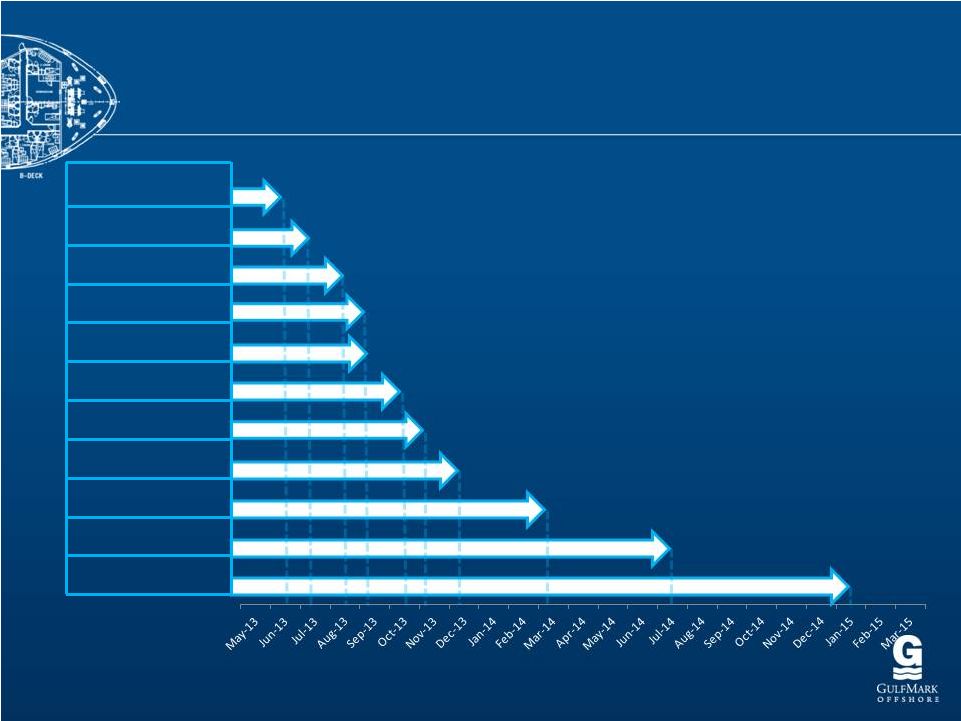 New Build Delivery Schedule
14
300 Class Europe
300 Class Artic Europe
280 Class Europe
300 Class Europe
280 Class US
250 Class Europe
300 Class Artic Europe
280 Class US
250 Class Europe
300 Class US
300 Class US |
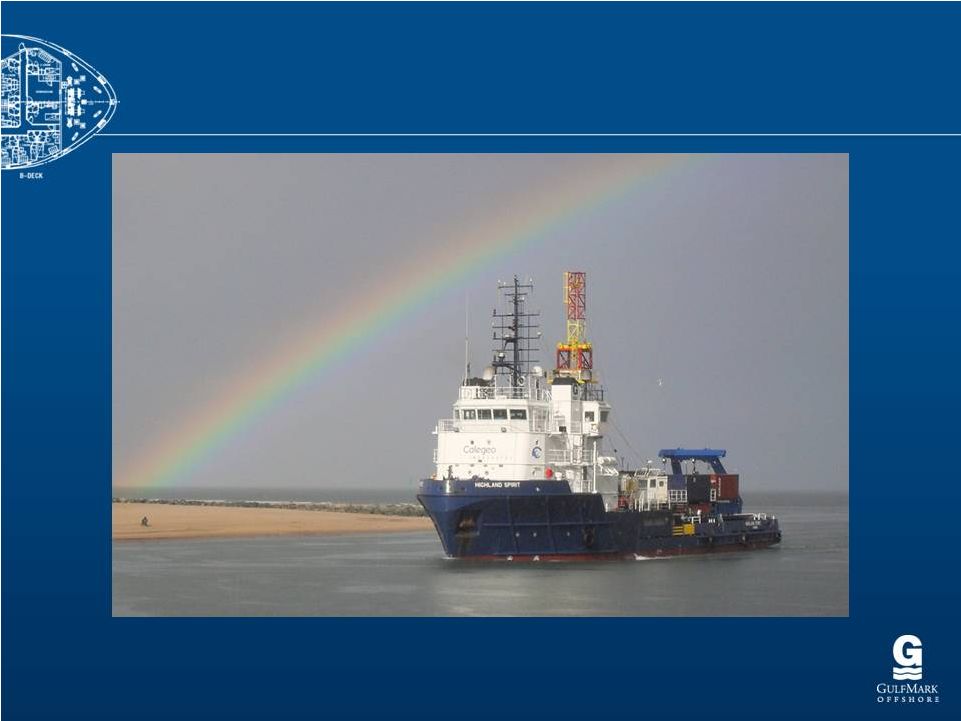 Market
Drivers
15 |
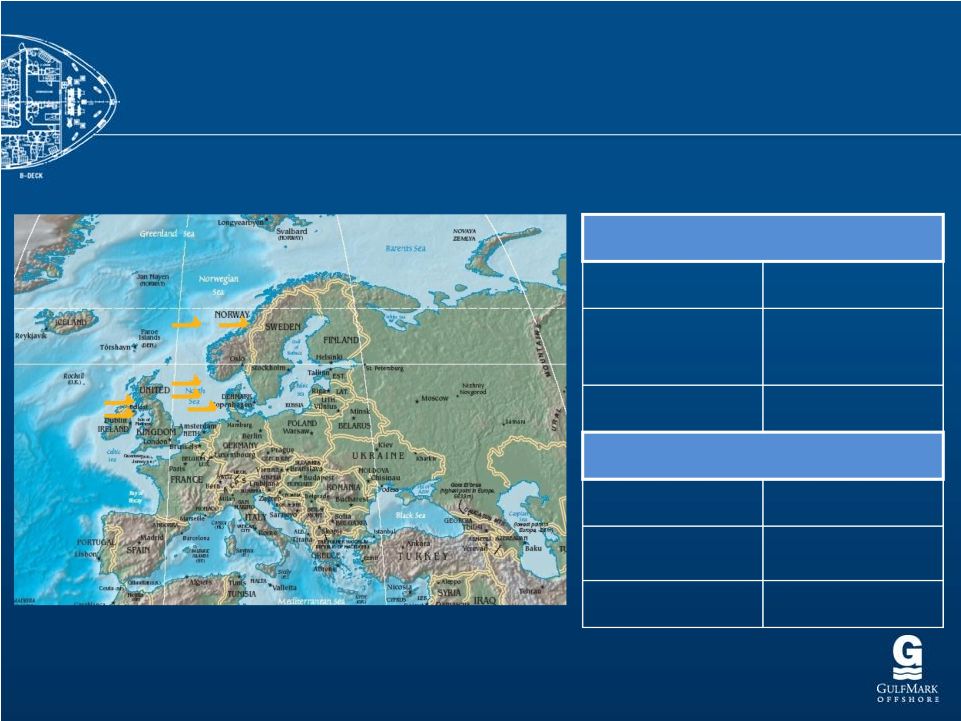 Rig Growth in the North Sea
16
Source: IHS Petrodata , Carnegie Research
Floating Rigs
Active
42
Scheduled
Arrivals/Activations
(through 2015)
15
% Increase
36%
Jackups
Active
42
Scheduled Arrivals
(through 2015)
11
% Increase
26% |
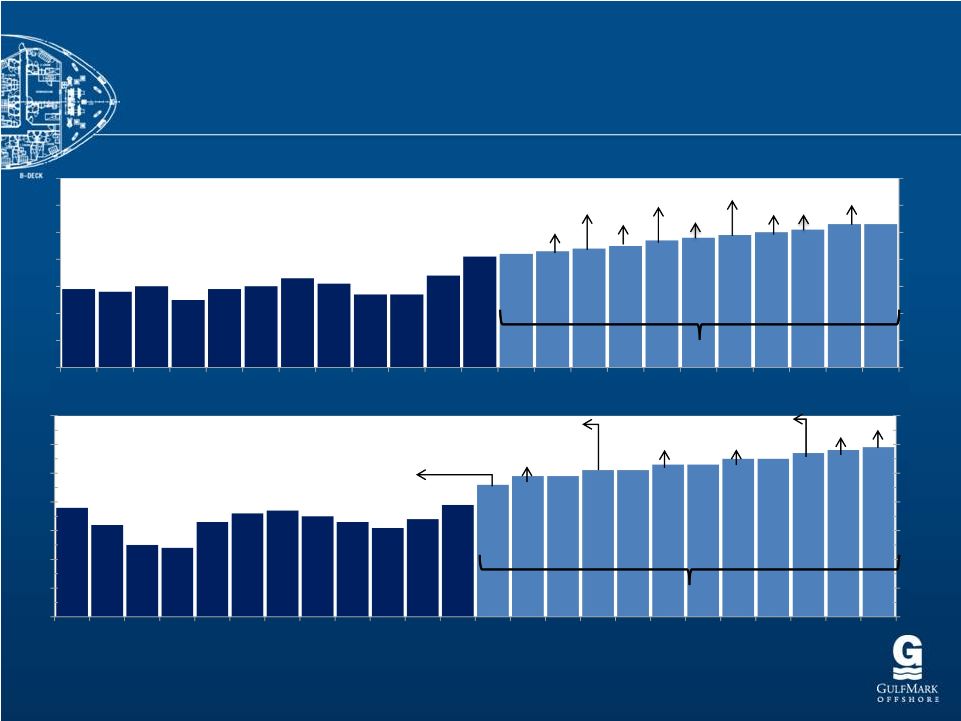 Rig Growth in the North Sea
17
Source: IHS Petrodata
Jackups
Floating Rigs
Planned
Planned
0
10
20
30
40
50
60
70
0
10
20
30
40
50
60
70
2001
2002
2003
2004
2005
2006
2007
2008
2009
2010
2011
2012
Q1
2013
Q2
2013
Q3
2013
Q4
2013
Q1
2014
Q2
2014
Q3
2014
Q4
2014
Q1
2015
Q2
2015
Q3
2015
Q4
2015
0
10
20
30
40
50
60
70
0
10
20
30
40
50
60
70
2009
2001
2002
2003
2004
2005
2006
2007
2008
2010
2011
2012
Q1
2013
Q2
2013
Q3
2013
Q4
2013
Q1
2014
Q2
2014
Q3
2014
Q4
2014
Q1
2015
Q2
2015
Q3
2015
Noble Regina Allen
Prospecter 1
ENSCO 120
Maersk XL
Enhanced 1
Maersk XL Enhanced 3,
Seadrill TBA #2
Noble Sam
Turner
Seadrill TBA
#1
ENSCO 121,
West Linus
Maersk XL
Enhanced 2
COSL Promoter ,
Leiv Erikson
Stena Carron,
Island Innovator
Eirik Raude
Songa Equinox,
Ocean Patriot
Deepsea Aberdeen,
Songa Endurance
Songa Encourage, Bollsta Dolphin
Songa Enabler
Atwood Advantage, Sedco 712
North Dragon |
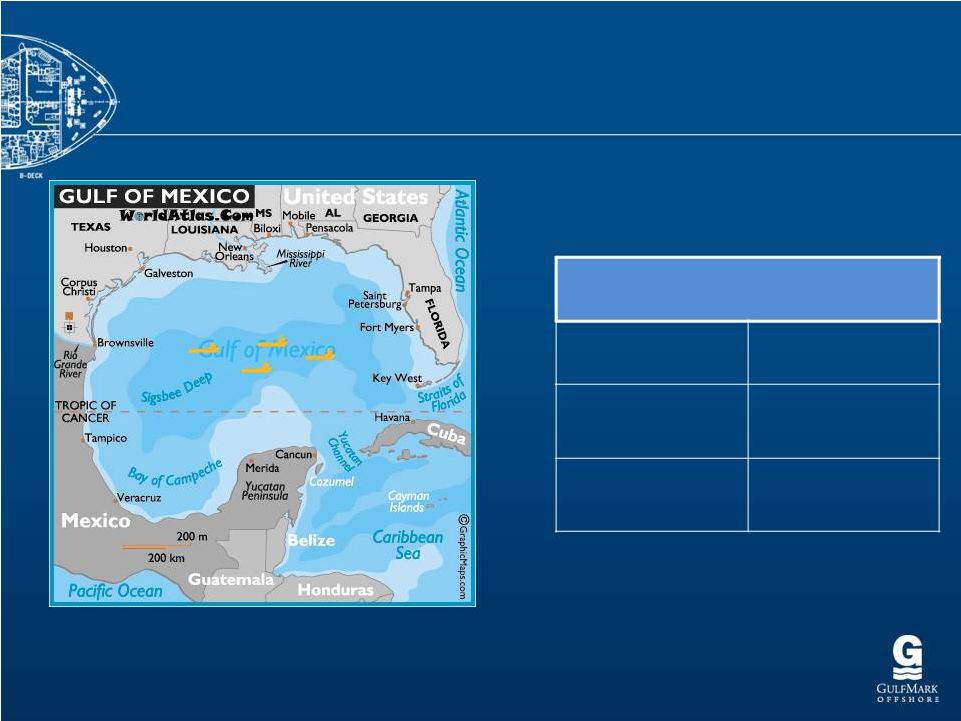 Floating Rig Growth in the U.S. GOM
18
Source: IHS Petrodata –
February 2013
Floating Rigs in U.S. GOM
Active
36
Scheduled Arrivals
(through Q1 2016)
14
% Increase
39% |
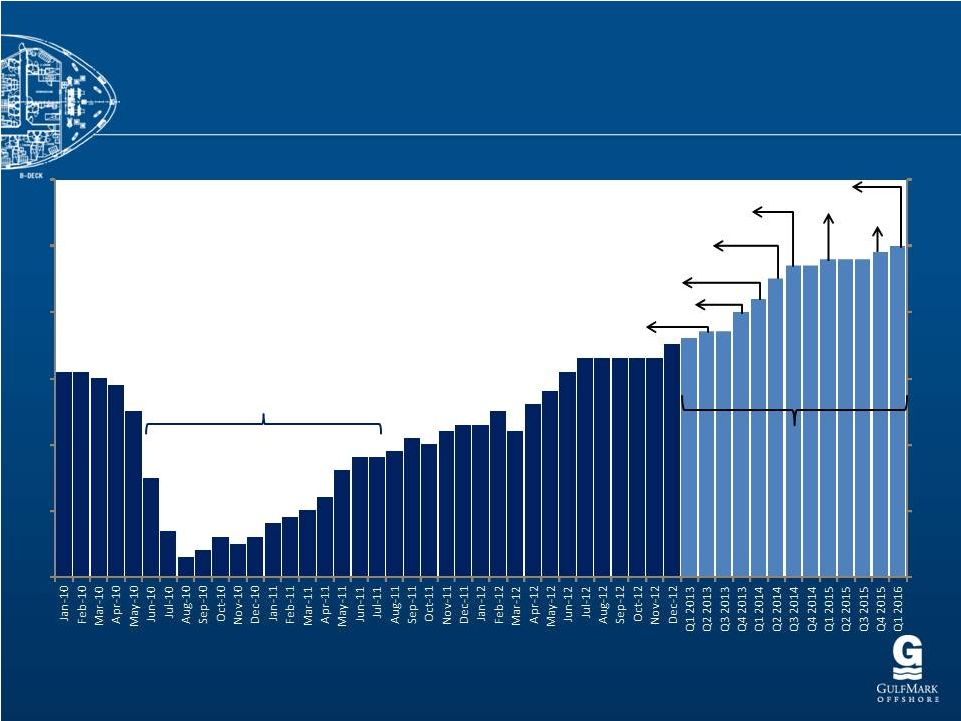 Floating Rig Growth in the U.S. GOM
Moratorium and Recovery
Planned
0
10
20
30
40
50
60
0
10
20
30
40
50
60
West Auriga, Ocean Confidence,
Noble Globetrotter II
West Vela, Maersk Drsh Tbn 1
Pacific Sharav
Sevan UDW 3
Noble Bob Douglas,
Maersk Deepwater Advanced 2
Rowan Renaissance
Transocean
TBN 1
Transocean TBN 2
Helix 534
19
Source: Barclays, IHS Petrodata
Deepwater Invictus, |
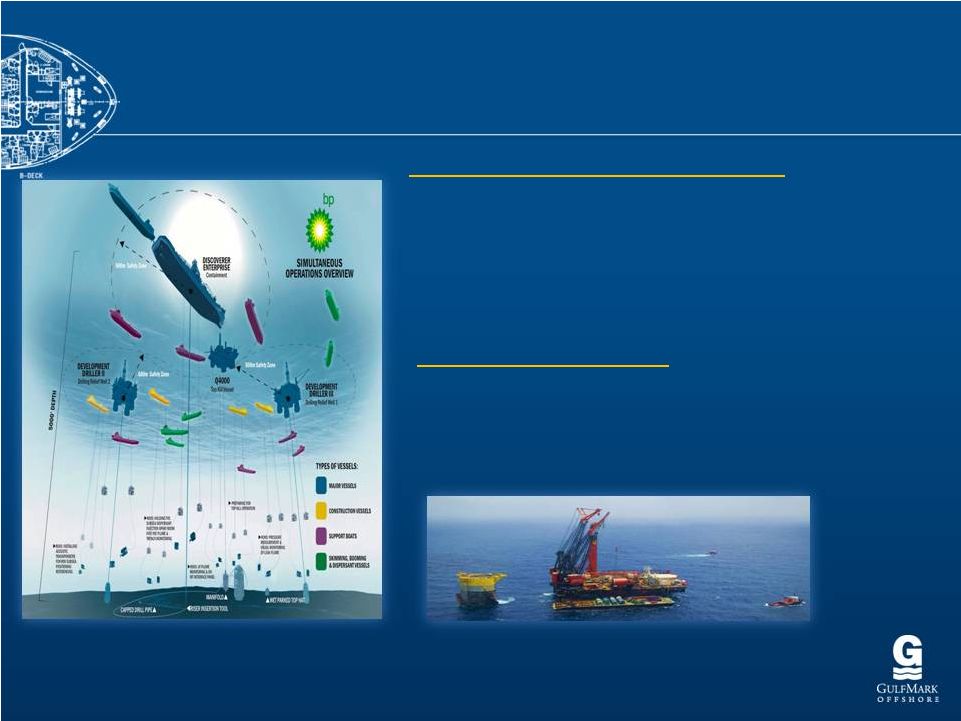 Worldwide Sub Sea –
Driving the Future
20
Source:
Douglas-Westwood’s World Subsea Vessel Operations Market Forecast
2012-2016 Sub Sea Activity is Continuing to Expand
•
Subsea Demand Expected to Increase 33% and
Annual Expenditure double to $20.3 Billion by 2016
•
Set to Top $77 Billion Over Next Five Years
•
Increase of 63% Over Previous Five Year Period
•
Sub Sea Work Requires Newer, More Specialized
Vessels and Support Equipment
FPSO
Spending
–
Projected
•
Between 2013 and 2017, $91bn Will be Spent on Floating
Production
Systems
(FPS)
-
an
Increase
of
100%
over
the
Preceding Five-Year Period.
•
A Total of 121 Floating Production Units are Forecast to
be Installed -
a 37% Increase |
 Financial Information
21 |
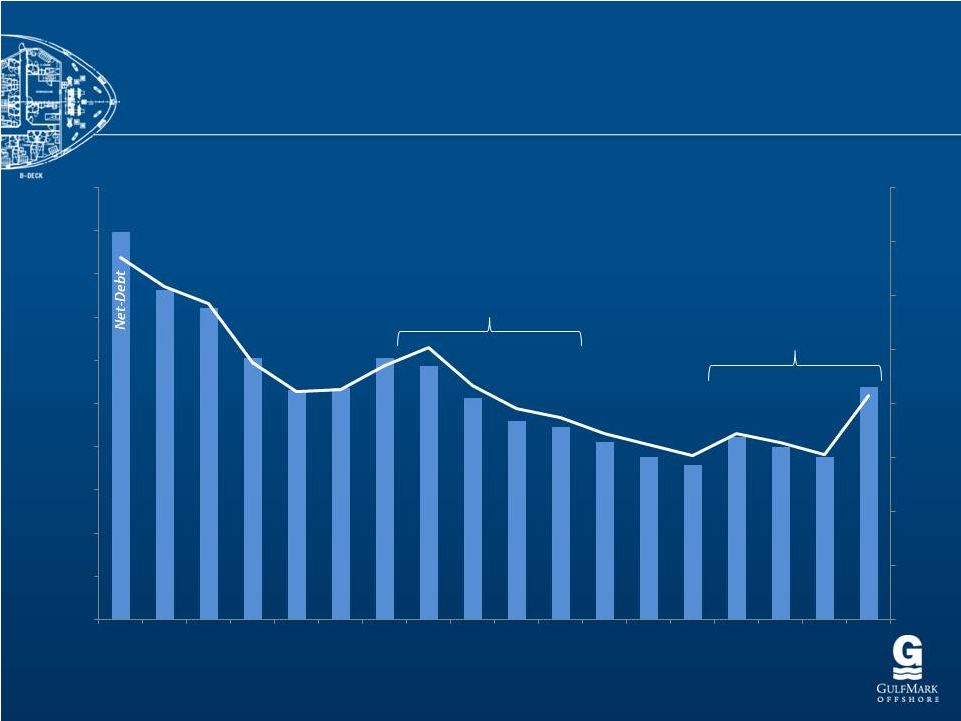 22
Net Debt Position
$500,000
$450,000
$400,000
$350,000
$300,000
$250,000
$200,000
$150,000
$100,000
$50,000
$0
Q3 2008
Q4 2008
Q1 2009
Q2 2009
Q3 2009
Q4 2009
Q1 2010
Q2 2010
Q3 2010
Q4 2010
Q1 2011
Q2 2011
Q3 2011
Q4 2011
Q1 2012
Q2 2012
Q3 2012
Q4 2012
40%
35%
30%
25%
20%
15%
10%
5%
0%
Net-Debt to
Total Book
Capitalization
Finalization of Previous New-
Build Program
Initiation of Current
New-Build Program |
 23
Investment Highlights
Industry Leaders in QHSE Performance & People Development
Global Presence and Diverse Operations Expertise
Financial Stability & Flexibility to Pursue Opportunities
Growth through Both Acquisition and New Construction
Young, Versatile, High-Specification Fleet |
 Reconciliation of Adjusted EBITDA
24
2002
2003
2004
2005
2006
2007
2008
2009
2010
2011
2012
Net (loss) income
$24.0
$0.5
($4.6)
$38.4
$89.7
$99.0
$183.8
$50.6
($34.7)
$49.9
$19.3
Interest expense, net
10.9
12.8
17.0
18.4
14.4
4.8
12.8
19.9
20.7
21.6
22.9
Income tax (benefit)
3.0
0.2
(6.5)
3.4
3.0
30.2
11.7
(2.1)
(12.7)
4.7
2.7
Depreciation & Amortization
21.4
28.0
26.1
28.9
28.5
30.6
44.3
53.0
57.0
59.6
59.7
EBITDA
59.3
$
41.5
$
32.0
$
89.1
$
135.6
$
164.6
$
252.6
$
121.5
$
30.2
$
135.8
$
104.6
$
Adjustments:
Impairment
-
-
-
-
-
-
-
46.2
97.7
1.8
1.2
Debt refinancing costs
-
-
6.5
-
-
-
-
-
-
-
4.4
Accounting Change
-
-
7.3
-
-
-
-
-
-
-
-
Other
(2.5)
1.3
(1.5)
(0.5)
0.1
0.3
(1.6)
1.2
(0.1)
2.3
1.8
Adjusted EBITDA
$56.8
$42.8
$44.3
$88.6
$135.7
$164.9
$251.0
$168.8
$127.8
$139.9
$111.9
EBITDA is defined as net income (loss) before interest expense, net,
income tax provision, and depreciation and amortization, which includes impairment. Adjusted
EBITDA is calculated by adjusting EBITDA for certain items that we
believe are non-cash or unusual, consisting of: (i) loss from unconsolidated ventures; (ii) minority
interest;
and
(iii)
other
(income)
expense,
net.
EBITDA
and
Adjusted
EBITDA
are
not
measurements
of
financial
performance
under
GAAP
and
should
not
be
considered
as an alternative to cash flow data, a measure of liquidity or an
alternative to income from operations or net income as indicators of our operating performance or any other
measures of performance derived in accordance with GAAP. EBITDA and
Adjusted EBITDA are presented because we believe they are used by security analysts, investors
and other interested parties in the evaluation of companies in our
industry. However, since EBITDA and Adjusted EBITDA are not measurements determined in accordance
with GAAP and are thus susceptible to varying calculations, EBITDA and
Adjusted EBITDA as presented may not be comparable to other similarly titled measures of other
companies. |
